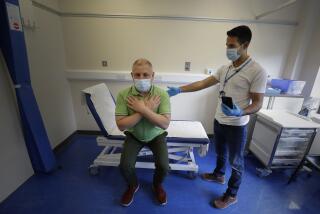AIDS: A GLOBAL ASSESSMENT : WESTERN EUROPE : Putting Out the Message, Politicizing the Issues
- Share via
Posters of 20-foot-long condoms complete with a quotation from Pushkin--”Still, love is possible”--bedeck public city buses in Denmark.
In Sweden, a “love bus” tours beaches and other vacation hot spots, dispensing brochures, T-shirts and free condoms as part of the nation’s $6.2-million awareness campaign against AIDS. In Stockholm’s red-light district, a poster without illustration asks, “Tonight, AIDS?”
In many Western European nations, pharmacists hand sterile needles to drug addicts, sometimes without charge. Some governments have mailed AIDS prevention leaflets to nearly every household in the nation.
Nowhere is the fight against AIDS more a part of everyday life than in Western Europe, where nations have responded to a dramatic rise in the number of AIDS cases with a volley of high-visibility activities.
Proposals for compulsory AIDS testing have also become heated political issues in France and West Germany, the two Western European nations that have registered more than 1,000 AIDS cases. Calls for compulsory testing have conjured up comparisons to Hitler’s early discrimination against Jews.
“I have the feeling that it won’t be long before we see again some people wearing the yellow star,” said Dr. Michelle Barzach, France’s health minister, after Jean Marie Le Pen, leader of France’s right-wing National Front party, called for twice-yearly screening of all French citizens, mandatory follow-up on all those who test positive for the AIDS virus and their sexual partners and confinement of confirmed AIDS cases in special clinics.
In Germany, the conservative state of Bavaria, despite objections from the federal government, has put into effect some of the world’s toughest anti-AIDS regulations, including mandatory blood tests for prostitutes, drug addicts, prisoners, public sector job applicants and foreigners seeking residence or work permits. This fall, right-wing politicians are expected to put forward similar proposals for the entire country.
“You can already see the ‘suspects’ rolling by in buses with bars on the windows, past shutters on shops with the letter ‘A’ painted on them and the words, ‘Don’t buy from AIDS victims,’ ” said an editorial in the Cologne newspaper Express, calling up images from Germany’s Nazi past.
Charges of racism and xenophobia have also been raised in Belgium. Since March, it has required that about 1,500 Third World scholarship students, almost all from Africa, be tested for AIDS antibodies. Those who test positive lose their scholarships and are sent home.
The total number of reported AIDS cases in Western Europe, 6,122, is still far less than the nearly 40,000 cases in the United States. But public health officials expect that tens of thousands of new AIDS patients will be diagnosed by the end of the decade.
AIDS is spreading by a variety of patterns. In northern nations, such as Britain, France, the Netherlands, Scandinavia, Switzerland and West Germany, homosexual men represent the preponderance of cases. This is also the case in Greece.
In Italy and Spain, the majority of patients are intravenous drug users concentrated in cities such as Milan, Barcelona and Rome.
In Belgium, with its post-colonial links to Burundi, Rwanda and Zaire, Africans account for about 55% of AIDS cases. Sexual contact with Africans is also a significant factor in a number of cases diagnosed in France and Greece.
In all nations, there is very little heterosexual transmission of the AIDS virus between Europeans.
“At present, we’re finding nothing at all outside the high-risk areas,” said Dr. Johan Wallin, secretary to the national commission on AIDS in Sweden.
His comments were echoed by a researcher in West Germany, who noted, “There is only a small number of AIDS in the heterosexual population, who in most cases had contact with the high-risk groups.”
The blitz of AIDS education and prevention programs has also followed several patterns. Many nations, including Britain, France, Sweden and West Germany, have launched extensive media campaigns to prevent transmission of the virus. Last year, the Swedish government mailed three condoms each to 240,000 men and women between the ages of 18 and 24 in Stockholm, Goteborg and Malmo, the three largest cities.
Sweden and West Germany have integrated AIDS awareness into their sex education curricula, which begins in elementary school with students at age 9 or 10.
Belgium, Britain, Sweden, Switzerland and West Germany distributed AIDS leaflets to most households. France is planning a mailing to 24 million households, based on telephone billing lists.
As evident in the commercial involving the Prime Minister Margaret Thatcher look-alike, the British campaign mixes a degree of levity with subtlety to convey its main message: “AIDS, Don’t Die of Ignorance.” One ad, known as the “AIDS iceberg ad,” pans a foreboding Arctic wasteland as an ominous voice states the facts about the disease.
A study by the Independent Broadcasting Authority in London showed that the number of Britons who considered themselves knowledgeable about the disease jumped from 48% to 77% following two months of the education campaign. However, the number in the survey who said they used condoms remained unchanged.
Britain, France, Greece, Italy, the Netherlands, Spain and Switzerland are among the nations trying to persuade intravenous drug users to use sterile needles, which can be obtained without a prescription.
France has Western Europe’s largest number of AIDS cases with 1,632. Its long-awaited AIDS-control program, announced in June, features free, voluntary and anonymous screening at hundreds of centers throughout the country and new funds for treatment and vaccine research.
In addition, 11 AIDS outpatient clinics will be opened this fall in Paris and other cities. The emphasis will be on medical day care for AIDS patients who need to be regularly checked but not hospitalized.
AIDS IN WESTERN EUROPE Austria . . 72 Belgium . . 230 Britain . . 870 Cyprus . . 3 Denmark . . 150 Finland . . 19 France . . 1,632 Greece . . 49 Iceland . . 4 Ireland . . 19 Italy . . 840 Luxembourg . . 7 Malta . . 5 Netherlands . . 260 Norway . . 45 Portugal . . 54 Spain . . 357 Sweden . . 129 Switzerland . . 266 West Germany . . 1,150 TOTAL CASES 6,161
More to Read
Sign up for Essential California
The most important California stories and recommendations in your inbox every morning.
You may occasionally receive promotional content from the Los Angeles Times.













